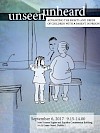Principles of Action for Children with a Parent in Prison: Document Launch
6th September 2017
 Background of the Project
Background of the Project
This ‘Principles of Action for Children with a Parent in Prison’ document is based on a project initiative undertaken by Dr. Fiona Donson, Dr. Aisling Parkes, School of Law, University College Cork, the Children’s Rights Alliance and IPRT. The project aims to raise awareness of the issues affecting children who have a parent in prison. The ‘Principles’ document sets out steps to take to recognise children affected by parental imprisonment and also provides examples of international models of best practice that respond to the needs of this cohort of children with the aim of inspiring progressive policy change relating to services and supports for children who have a parent in prison.
Key Findings:
There is a dearth of information on the number of children with a parent in prison in Ireland. The document raises a number of key issues for this cohort of children including:
- Voices of children who have a parent in prison are not being heard;
- No data in Ireland regarding access to service provision and supports for children with a parent in prison
- Needs of children affected by parental imprisonment not being considered at key stages of the criminal justice system including: arrest, sentencing or imprisonment
- Lack of data on the uses of alternatives to custody for parents;
- Lack of robust data sets on the impact imprisonment of a parent has on children from the child’s perspective.
As a result, a set of ‘Principles of Action' were compiled and the principles are described below:
Principle 1: Build a solid knowledge base
Recommendation 1. Gather data on the current situation of children with a parent in prison in Ireland
Recommendation 2. Map services in Ireland available for children with a parent in prison
Recommendation 3. Increase the current knowledge base on the issues of children with a parent in prison in Ireland
Principle 2: Hear the voices of children with a parent in prison
Recommendation 4. Develop and effectively employ mechanisms to ensure that children with a parent in prison have their voices heard
Principle 3: Recognise the holistic needs of children with a parent in prison in National Policy
Recommendation 5. A clear statement outlining a commitment to State action supporting this group of children should be adopted.
Recommendation 6. Adopt a holistic approach to policy and service provision in order to address the needs and rights of children with a parent in prison.
Recommendation 7. Establish an inter-departmental working group led by the Department of Children and Youth Affairs to develop an inter-agency strategy to ensure better collaboration on the issue.
Principle 4: Establish multi-agency partnerships at local level and national levels
Recommendation 8. Promote the establishment of multi-agency partnerships at both local and national level which can coordinate service level approaches.
Principle 5: Develop monitoring frameworks
Recommendation 9. The state should formally recognise children with a parent in prison as a priority for monitoring these children’s needs and outcomes in accordance with basic children’s rights protections in Ireland.
Principle 6: Raise awareness of the issue
Recommendation 10. Provide children with a parent in prison with clear information regarding their rights and the services and supports available to them.
Recommendation 11. Develop and disseminate information and educational resources to challenge the stigma commonly associated with having a parent in prison
Reliable Data:
Data on the number of children with a parent in prison is not currently collected within Ireland but it is estimated that there are around 6,000 children with a parent in prison at any one time (1). The absence of reliable data means that the needs of children with a family member in prison or a prisoner who is a parent cannot be met. There is also a lack of accurate data mapping services for children of imprisoned family members, rates of engagement with services or information of services available provided to families of prisoners or the prisoners themselves.
Next Steps:
This initiative calls on the Department of Children and Youth Affairs, as well as other relevant stakeholders in society, such as the Department of Education, to recognise the needs of children affected by parental imprisonment as a distinct group in national policy.
Best practice models from other jurisdictions, such as the Families Outside organisation in Scotland, who assist educators and family members with resources that can be used in the creation of support structures and safe spaces for children to talk about their experiences of having a family member in prison should be followed.
Inspiration should be taken from the Memorandum of Understanding produced in Italy; an interagency collaboration between the Ministry of Justice, The National Ombudsman for Childhood and Adolescence and Bambinisenzasbarre, an NGO working with children with a parent in prison.
The rights and voice of the child should be placed at the centre of decisions made in relation to the arrest, sentencing and penal policies impacting on parents and families with children and to recognise their needs in their own right.
This project was funded by the Irish Research Council under the New Foundations Scheme.
(1) DataKind: Supporting Change In Irish Prisons
Download the Explanatory Document here.
Also see:
- Unseen Unheard: 'Principles of Action for Children with a Parent in Prison'
- San Francisco Children of Imprisoned Parents Partnership Bill of Rights
- IPRT report: “Picking up the Pieces”; The Rights and Needs of Children and Families Affected by Imprisonment
- Irish Prison Service Presentation: Family Links; Supporting Parenting for Prisoners and their Partners




